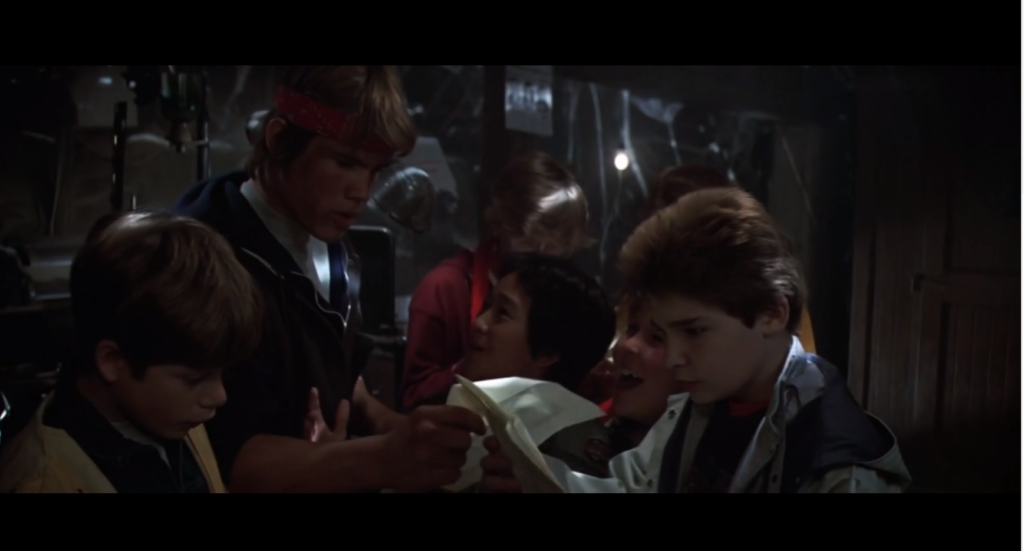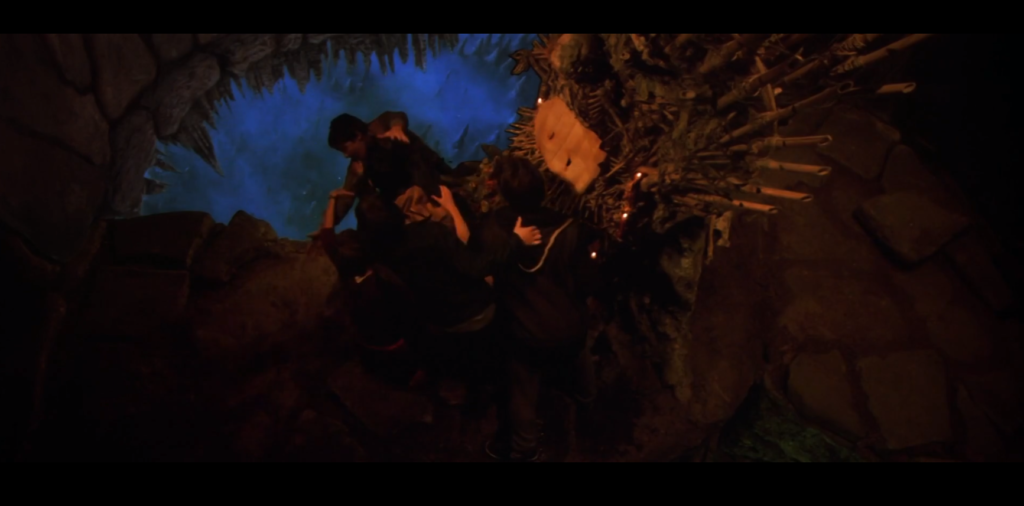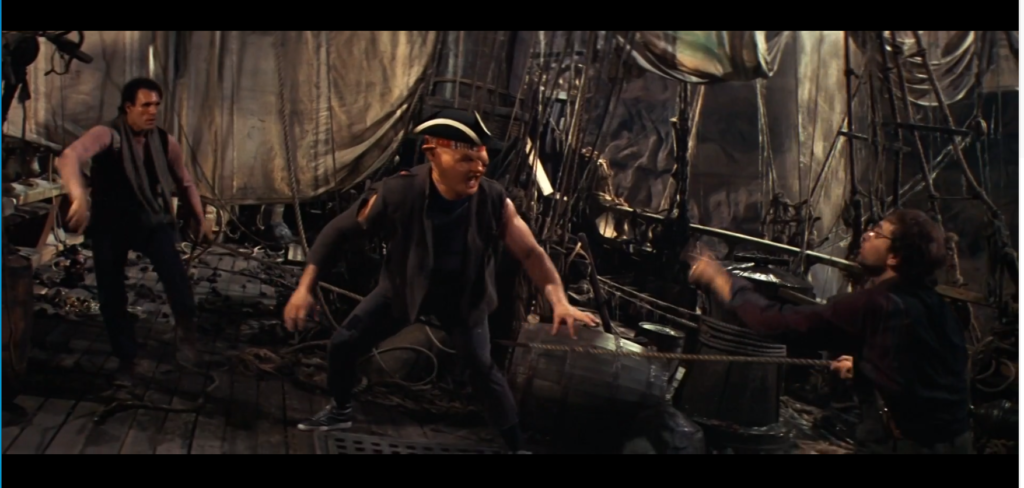|
Genres:
- Hidden Treasure
- Misfits
- Pirates
- Search
- Teenagers
Response to Peary’s Review:
I have fond memories of viewing Steven Spielberg’s The Goonies — about “a group of young outcasts” who “try to save their old-Seattle neighborhood from redevelopment” — in the theater as a kid. Rewatching it recently as an adult, I can begin to understand why Peary labels it “extremely disappointing”; he’s right to note, for instance, that “the young boys who take part in the adventure are loud, vulgar, and in need of babysitters”. Yet I’m not sure I agree with his assessment that “there is a mean and rude, rather than good-natured, feel to the entire film”. While the movie is derivative, manipulative, and hopelessly cliched, I can’t help remembering how exciting I thought it was as a kid, and this colors my impressions even today. After all, what kid among us wouldn’t wish to make new friends and go searching for buried treasure behind their house? How could creepy villains, booby-trapped caves, and the possibility of endless gold coins fail to excite? The Goonies has recently become a cult classic, with special midnight showings where fans recite lines verbatim; as one online reviewer described it, “For the uninitiated it is a mystery. For the fans it is a classic.”
Redeeming Qualities and Moments:
- Many exciting, well-staged adventure sequences


- Impressive make-up on John Matuszak as Sloth

- A rocking Cyndi Lauper song
Must See?
Yes, simply for its cult status as a classic ’80’s adventure flick.
Categories
Links:
|
3 thoughts on “Goonies, The (1985)”
First and last viewing.
The film’s largest appreciative audience may possibly be those affectionately referred to as geeks – because there is something very geeky about ‘Goonies’.
Personally, I rarely have a negative reaction this strong toward a film but I hated just about every minute of it. It’s definitely loud and vulgar – also abrasive and annoying. On occasion, the film also appears to have ADD. On top of all that, we get an added dose of cutesy every so often.
It could just be that I am definitely not the audience here. I know the film has a strong cult status. But, clearly, I avoided this film for years for a reason. There is something about scripts by Chris Columbus that is a brand of sophomoric and simple-minded. (Something Joe Dante managed to side-step when directing ‘Gremlins’, thankfully.) Whatever its forced quality is, I don’t tend to warm to it.
The Goonies is what it is supposed to be: a fun matinee for pre-adolescents. It isn’t terribly imaginative, its script isn’t Oscar worthy, its characters aren’t thoroughly developed but the kids’ interactions are believable. The Goonies can be grating to one another at times, big shocker for young teens to do such things. But they’re mostly, if not all, likable. The relationship between Chunk and Sloth, two lovable losers is hilarious and at times adorable. The film is well-edited and doesn’t allow itself to get bogged down anywhere. The scene setups feel loose, improvised and clumsy at times (and Richard Donner resurrected this style for the Lethal Weapon movies he began directing two years later). You’ve got the cool tunnels and booby traps and (spoiler alert) the pirate ship. None of these seem like much now, but in the theater to a kid in the 80s, the sets and props looked magnificent on screen, and were shot with expert care. There are no anchoring adults in this movie, they’re mostly wallpaper, and it isn’t about them. Alas, this type of movie still exists, it’s just not highbrow fare, but so what? And for this toss-off effort, Goonies succeeds just fine.
As for his remarks about tone, Danny Peary has an idiosyncratic fixation at times on manners that he doesn’t apply evenly from film to film. He clearly doesn’t appreciate the fact that Goonies isn’t what he considers to be “good-natured” and there seems to be borderline resentment that it succeeded: “How this extremely disappointing film got good reviews is a complete mystery…” He was similarly annoyed that Ghostbusters did well as he didn’t like Bill Murray’s rude character: “I think this Murray character is really a jerk with whom we shouldn’t laugh.” He devotes a considerable length of his review (to the point of distraction) to lamenting the fact that the memorable dialogue involving Murray was enjoyed by audiences. Then in Risky Business, a movie which critics virtually all drooled over (and deservedly so), add Peary to the long list, there were (among other things) rude teenagers taunting and humiliating one another in spectacular fashion at times (did you ever send a hooker to your friend’s house in high school and then refuse to correct the situation when asked?). This, despite being central to the plot and charm, gets only a brief cryptic mention here from Peary as he recognizes a teenager is concerned with “…keeping honor in front of friends…” Risky Business gets a pass here because it’s “not the expected exploitation film…” But hey, at least none of its characters had to do the ‘truffle shuffle.’
An interesting one. I was 18 in 1985 and didn’t see this as my interests in film were turning away from just bug budget Hollywood blockbusters. We moved to the UK in 1983 (born in the US to English parents) and we were spoiled by BBC2 and Channel 4 who used to show foreign, indie and unusual films frequently.
I was aware of Goonies and thought it just another US kids flick so never gave it much mind. My English wife Catherine (born in 1976) is a big fan and when we met it was one of the childhood favourites she shared with me.
I wasn’t keen. I didn’t hate it like David, but equally didn’t love it either like Sylvia and Catherine. I’d certainly watch it again were she to pop it in the Blu-ray player but not one I would personally select myself. It’s a bit garish and over egged despite good performances. I found the gang a little obnoxious and annoying. Beyond that, I don’t recall a huge amount about it. It’s a Richard Donner film so will obviously be a quality product overall (and produced by Spielberg) with good Panavision lensing and production values.
I think I have to agree with David in that you had to be the right age when it was first released, or when you first saw it.